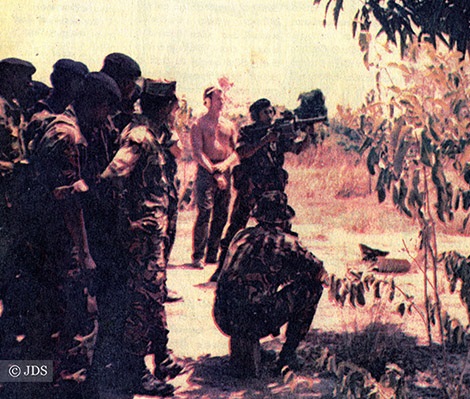Photograph: A UK mercenary pictured training Sri Lankan soldiers in the 1980s. JDS Lanka
Britain’s Foreign Office plans to shred dozens more files about its relationship with Sri Lanka, in addition to the hundreds of diplomatic it has already destroyed, writes Phil Miller in JDS Lanka this week.
“I found, from British air force files that had survived the shredder, that a senior British intelligence officer made two visits to Sri Lanka in 1979 to advise how to deal with the Tamil militancy,” writes Miller. “In 1980, a British special forces training team visited Sri Lanka to help set up an army commando unit.”
Destroyed files include the following titles:
- UK Military Assistance to Sri Lanka
- Sri Lankan Police Force
- Sri Lanka: Security Assessment
- Export Licence Applications for Sale of Military Equipment to Sri Lanka
- Sri Lanka: Military Visits to UK
- Sri Lanka: Defence Visits from UK
- Sri Lanka: UK Military Assistance
- Tamil community in Sri Lanka
- Human rights in Sri Lanka,
- Police training for Sri Lanka
- Applications for political asylum from Sri Lanka
- Sri Lanka interest in Northern Ireland as a military problem
- Detention of British nationals in Sri Lanka
- Terrorist activity in Sri Lanka against British nationals
Miller goes on to say,
“For now though it seems urgent that the Foreign Office is challenged about its casual attitude towards preserving Tamil history. As a journalist I have exposed the destruction by writing newspaper articles about it, and several people have written to their MPs. However, I am yet to see a single British politician raise this issue in Parliament, or any lawyer try to challenge the legal basis for what some might regard as sheer vandalism. Burning books was the stuff of Nazi bonfires, but shredding history seems to be a very British tradition.”
See the full piece on JDS Lanka here.
We need your support
Sri Lanka is one of the most dangerous places in the world to be a journalist. Tamil journalists are particularly at threat, with at least 41 media workers known to have been killed by the Sri Lankan state or its paramilitaries during and after the armed conflict.
Despite the risks, our team on the ground remain committed to providing detailed and accurate reporting of developments in the Tamil homeland, across the island and around the world, as well as providing expert analysis and insight from the Tamil point of view
We need your support in keeping our journalism going. Support our work today.
For more ways to donate visit https://donate.tamilguardian.com.


